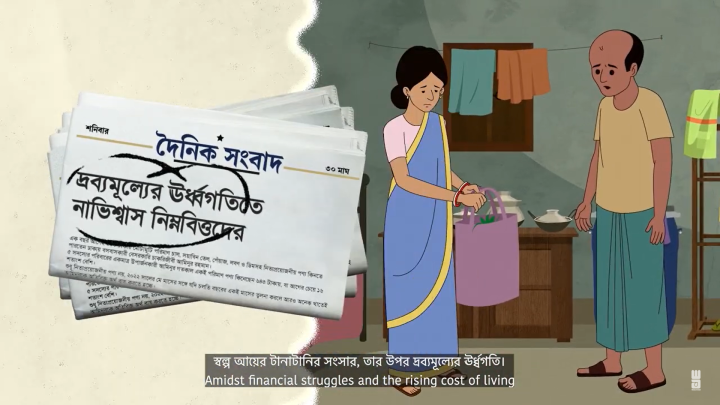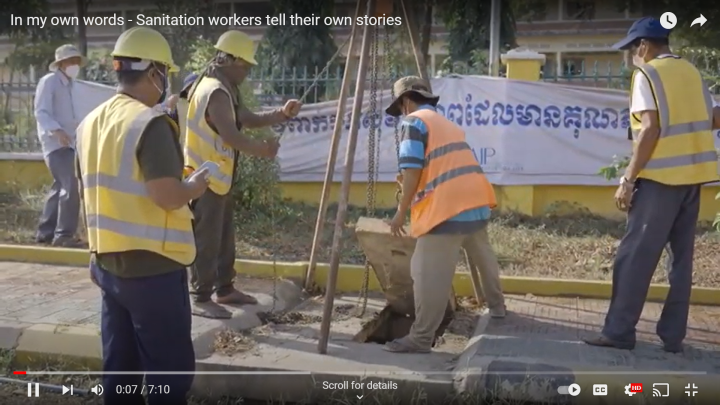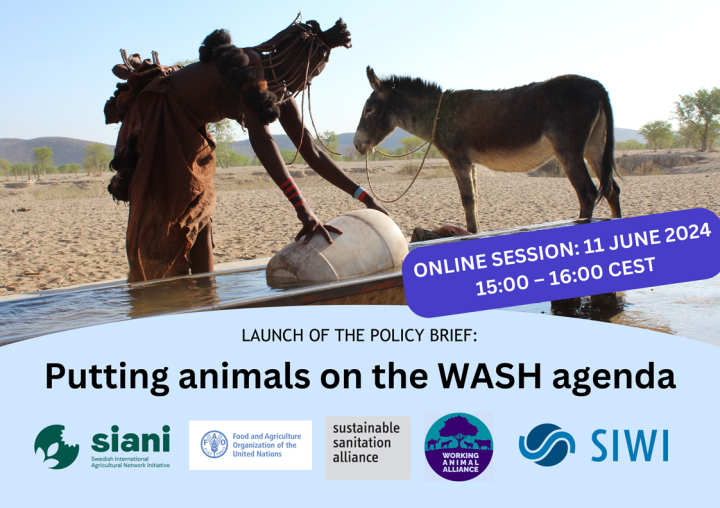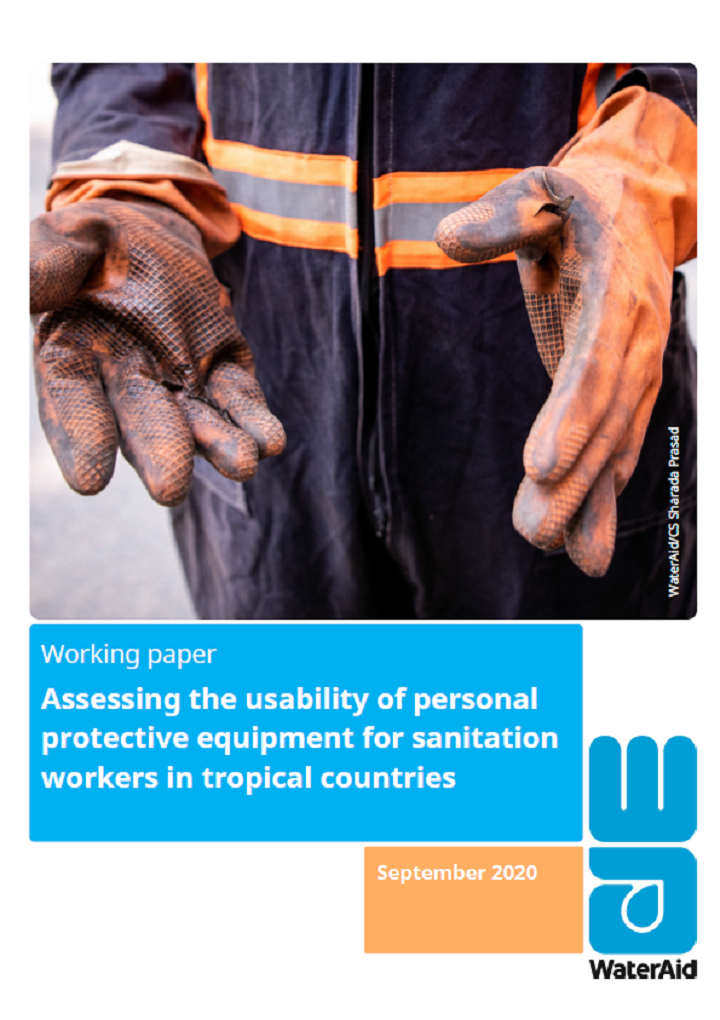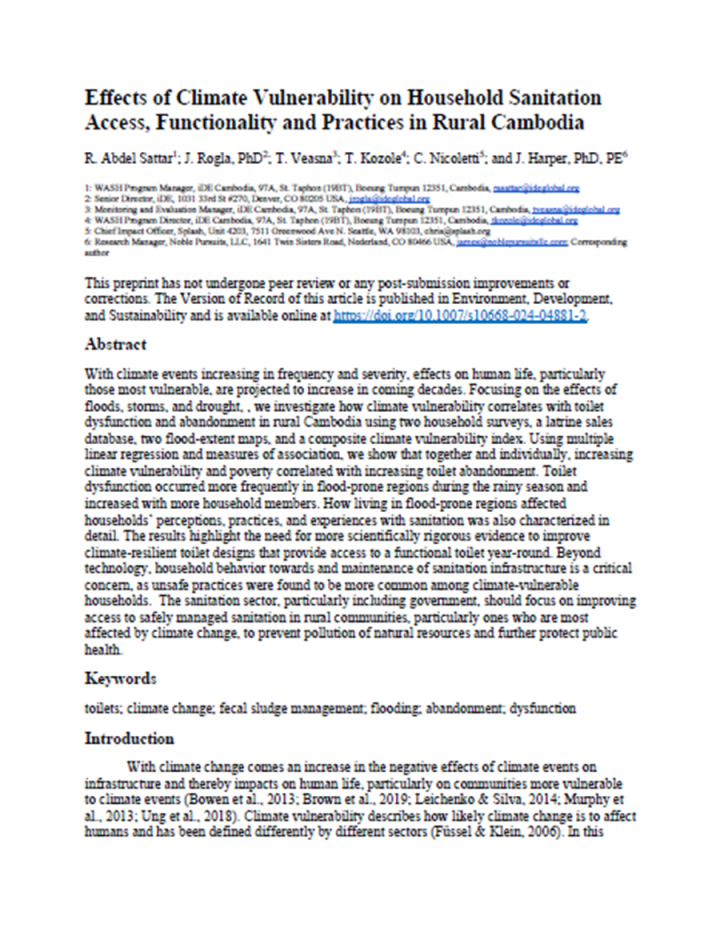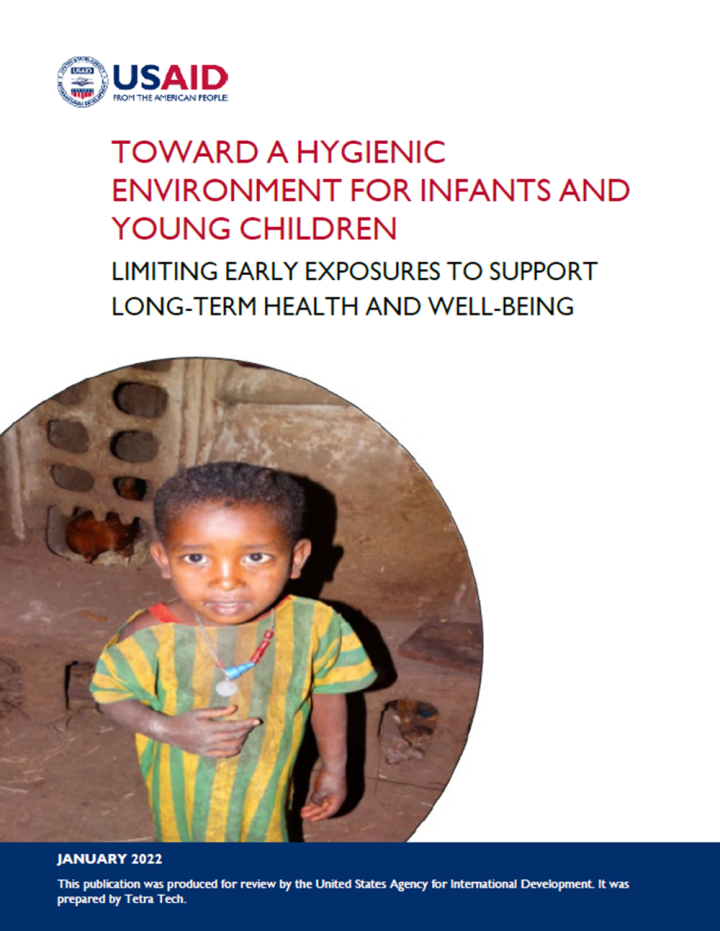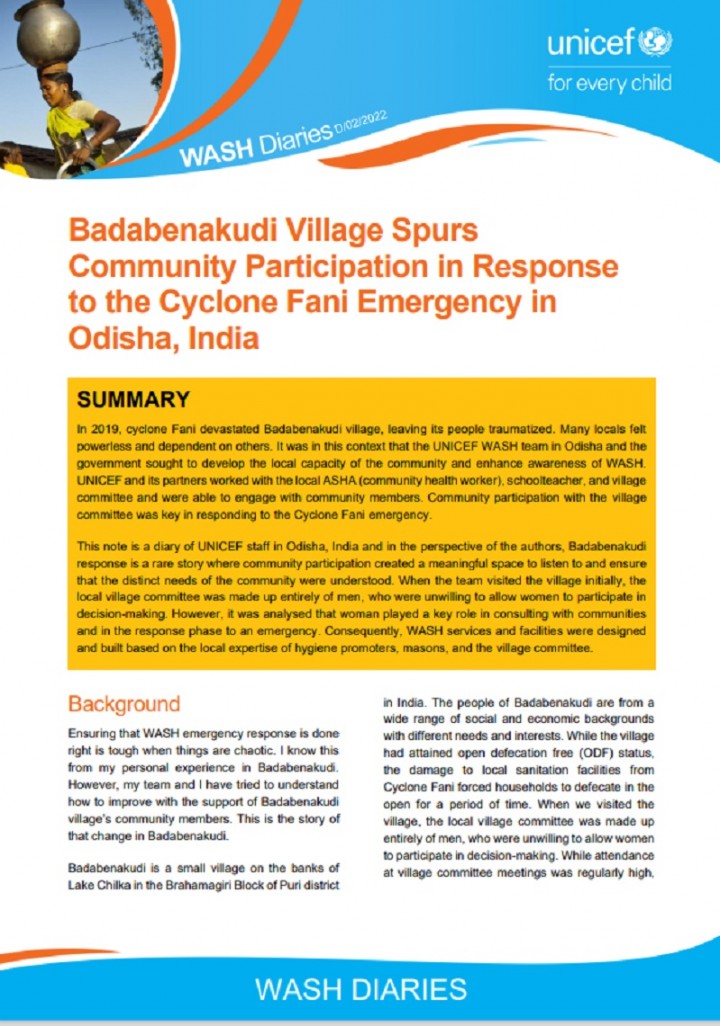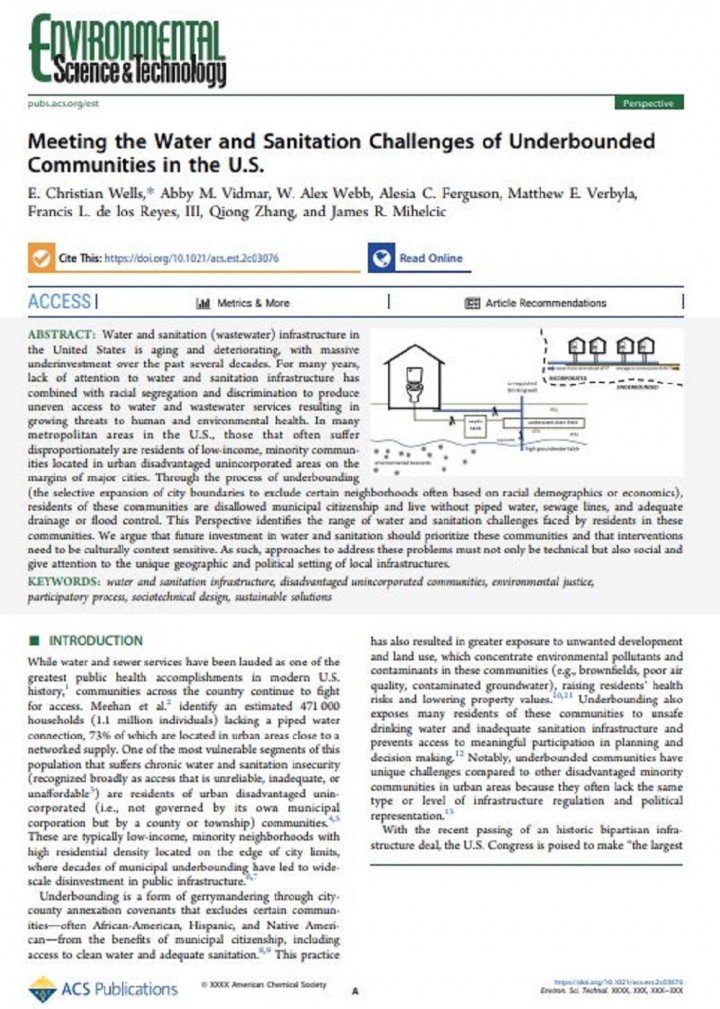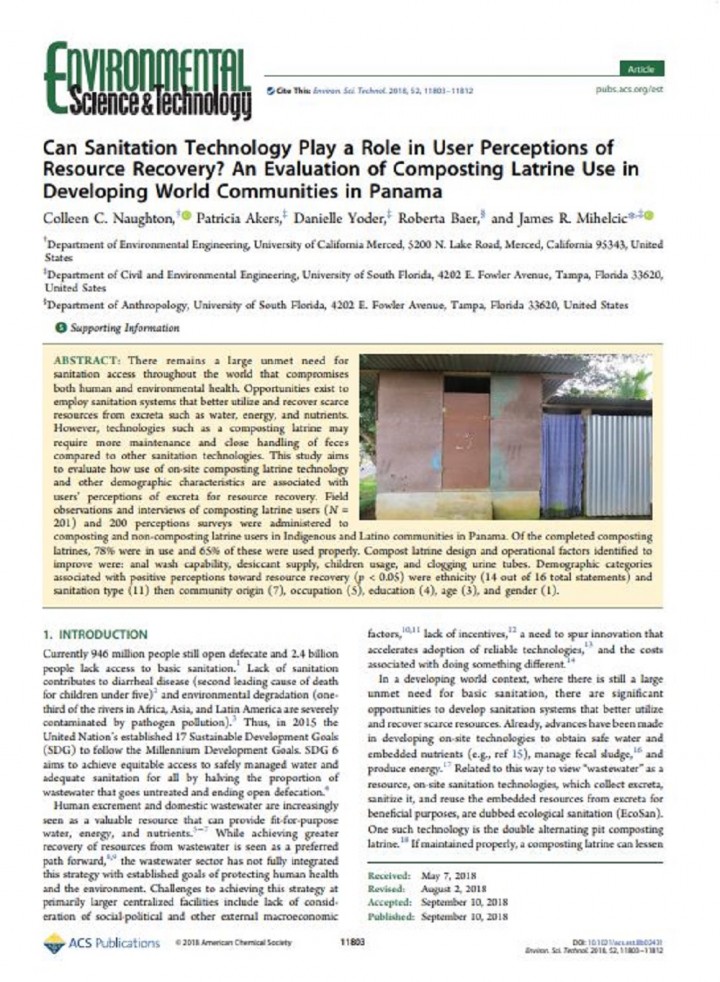Searching for information on Sanitation Workers?
The Sanitation Workers Knowledge + Learning Hub is the best source for all current news, trends, articles and updates on sanitation workers rights around the world.
WaterAid in collaboration with Waadaa.Insure and Chartered Life, introduced Shasthya Nirapotta Scheme (SNS), a health protection scheme for low-income people specially the sanitation workers to ease their struggles and triumphs.
This health protection initiative is designed to improve healthcare access and provide financial support in the event of the premium holder's death. This innovative …
Though a lot of efforts and supports have been provided to sanitation workers, still their nature of works are critical and dangerous to their health and hygiene, and most of the time lack of respect, support and collaboration from local people.
Sanitation workers of in Battambang city have full right like other citizens. They are key workers that shall be treated with respect, recognition, …
Animal species are an integral part of the systems that supply our drinking water and ensure that we live healthy lives. Yet, interventions to promote water, sanitation, and hygiene (WASH) often fail to consider animals’ roles, needs, and impacts on the services and implications of WASH systems for animals with whom we share water sources.
Efforts to meet SDG target 6.2 overlook sanitation workers' health and safety. In low- and middle-income countries (LMICs), workers lack proper personal protective equipment (PPE), leading to risks of injury and illness. Even when available, PPE is inconsistently used. This study examines PPE usability for sewer cleaners and tank emptiers in tropical countries, finding inadequate design and …
With climate events increasing in frequency and severity, effects on human life, particularly those most vulnerable, are projected to increase in coming decades. Focusing on the effects of floods, storms, and drought, , we investigate how climate vulnerability correlates with toilet dysfunction and abandonment in rural Cambodia using two household surveys, a latrine sales database, two …
Direct ingestion of animal and human feces in soil as well as exploratory mouthing by infants and young children remain underemphasized pathways of fecal pathogen exposure impacting child health and growth, as highlighted in the 2018 Water, Sanitation, and Hygiene Partnerships and Learning for Sustainability Program (WASHPaLS) desk review, “Toward a Hygienic Environment for Infants and Young …
O procedimento de revisão de cinco passos desenvolvido pela iniciativa de promoção de SFD garante a padronização de todos os relatórios SFD publicados no Portal Web de SFD. Teremos o prazer de fornecer comentários sobre o seu relatório SFD.
Um membro do grupo de especialistas fornecerá comentários sobre a avaliação e orientará você através da verificação de qualidade para …
El procedimiento de revisión de cinco pasos desarrollado por la iniciativa de promoción de SFD garantiza la estandarización de todos los reportes SFD publicados en el Portal Web de SFD. Estaremos encantados de proporcionarle comentarios sobre su reporte SFD.
Un miembro del grupo de expertos le proporcionará comentarios sobre la evaluación y lo guiará a través del control de calidad para …
The idea of a WASH Network Circle was born in 2022 from bilateral discussions between SuSanA and other networks, who expressed the need for key networks in the WASH sector to harmonise their activities and identify synergies. The WASH Network Circle was officially launched in Bonn in May 2023 during a meeting hosted by GIZ. Key networks including IWA, FSMA, GWOPA, pS-Eau, SSWM, SWEP, WIN, SaniHub …
"Follow your heart!" How a Bollywood star is empowering Nepalese women and winning our hearts in the process
Keki Adhikari is a Nepalese superstar with 1.3 million followers. Join us as we celebrate the power of change, which is only accepted when it reaches the heart. Keki talks about taboo subjects such as menstruation and forced marriage, slowly but surely changing women's rights in Nepali …
In 2019, cyclone Fani devastated Badabenakudi village, leaving its people traumatized. Many locals felt powerless and dependent on others. It was in this context that the UNICEF WASH team in Odisha and the government sought to develop the local capacity of the community and enhance awareness of WASH. UNICEF and its partners worked with the local ASHA (community health worker), schoolteacher, and …
Water and sanitation (wastewater) infrastructure in the United States is aging and deteriorating, with massive underinvestment over the past several decades. For many years, lack of attention to water and sanitation infrastructure has combined with racial segregation and discrimination to produce uneven access to water and wastewater services resulting in growing threats to human and …
There remains a large unmet need for sanitation access throughout the world that compromises both human and environmental health. Opportunities exist to employ sanitation systems that better utilize and recover scarce resources from excreta such as water, energy, and nutrients. However, technologies such as a composting latrine may require more maintenance and close handling of feces compared to …
Workshop to connect key learnings from other sectors (for example, solid waste management, waste picking) to advocacy and research on sanitation work (human waste management) across the world.
Speakers
1. Sonia Dias (WIEGO's Global Waste Expert)
2. Christy Braham (WIEGO, Belgium)
3. Lakshmi Narayan (KKPKP Waste Pickers Union, India)
4. Nalini Shekar (Hasiru Dala, India)
5. Dr …
Polite notice: This session includes detail (through the documentary film and presentations) about real-life cases of sanitation worker deaths and injuries, which some viewers/attendees may find upsetting*
Workshop to connect key learnings from the labour and human rights sectors (on occupational health and safety, formalisation, collectivisation, worker entitlements and responding to labour …
Sanitation workers provide essential services often at cost of their health and dignity. Little research has been done and there is an urgent need for evidence for policy and programs. Participants in this workshop will hear from moderators on challenges and contribute to setting a global published research agenda by proposing research questions.
Chairs: Kate Medlicott & Abisola Osinuga …
Includes reflections on the Garima Scheme in Odisha, India from G. Mathivathanan (Principal Secretary to Govt Housing & Urban Development Department, Government of Odisha, India), Manvita Baradi (Director, Urban Management Centre) and Meghna Malhotra (Deputy Director, Urban Management Centre).
About Garima
The Garima scheme for Safety and Dignity of Core Sanitation Workers was launched in …
Thousands of lives of sanitation workers are endangered and lost in low and middle income countries (LMICs) while manually cleaning confined spaces like septic tanks and sewer lines. These deaths are avoidable if we take corrective measures. Join us to discuss leading practices that cities can observe to make work safer for sanitation workers!
Speakers
Prabal Bhardwaj, PMU- SBM, Ministry of …
This session examines some of the ways in which to enhance Occupational Health and Safety (OHS) of sanitation work, via technical innovations, as well as targeted laws, policies and regulations. The speakers highlight a number of worker-centred avenues to strengthen OHS, as well as key gaps where further participatory research and advocacy is urgently needed.
Speakers
1. Froggi VanRiper …
This session examines the multiple ways in which Covid-19 has affected sanitation workers at their workplace and in their personal lives. The speakers highlight how the pandemic disproportionately impacted sanitation workers who were on the 'frontline', yet often had little to no personal safety equipment, work protections or faced intense work pressure. We discuss potential opportunities arising …
*French with English translation*
This session examines the intersectional dimensions of sanitation work relating to gender, caste, class, race and age (including inter-generational change). The speakers cover particular challenges for women sanitation workers in India, Côte d'Ivoire, Madagascar and Senegal, and explore ways in which to visibilise often hidden or unseen working practices and …

